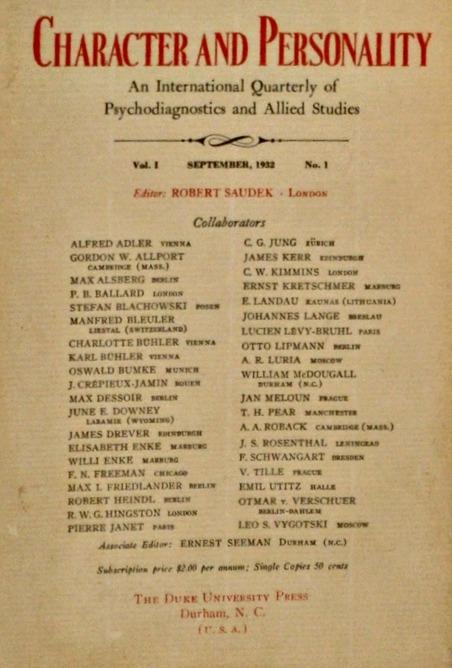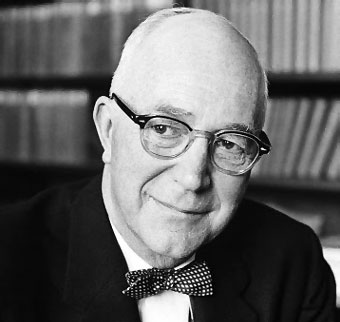Psychology Classics On Amazon

Personality Psychology
"The ultimate goal of personality psychology is to construct a scientifically credible account of psychological individuality. Such an account must situate a person in a biological and cultural context while specifying how that person is similar to and different from other persons." Dan P. McAdams
Who Are You, Really? The Puzzle of Personality
Brilliant TED Talk by Dr. Brian Little, an acclaimed scholar in the field of personality and motivational psychology.
Historical Highlights
On the 31st December 1691, Christian Thomasius, a German Enlightenment philosopher and jurist published one of the earliest accounts of systematic personality assessment. Originally presented in the form of a letter under the wonderful title 'New Discovery of a Solid Science, Most Necessary for the Community, for Discerning the Secrets of the Heart of Other Men from Daily Conversation, Even Against Their Will;' Thomasius suggested that the key to assessment lies in the ability to differentiate between a person's natural and affected feelings along with the knowledge that people resist overt displays of crude emotion.
Building on his work in a later publication, Thomasius produced the first quantitative psychological rating scale based on four inclinations: 1. Rational love (Vernünftige Liebe), 2. Sensuousness (Wollust), 3. Ambition (Ehrgeiz), 4. Acquisitiveness (Geldgeiz).
Thomasius believed that we all possess these inclinations to a greater or lesser extent and that one of the four will always be dominant.
In order to measure individual differences Thomasius allocated 60 points to the strongest inclination, a minimum of 5 points to the weakest inclination and scored the two remaining inclinations by calculating the difference between the highest and lowest scores.
On the 8th of September 1932, The first volume of 'Character and Personality: An International Quarterly of Psychodiagnostics and Allied Studies' was published by Duke University.
Devoted to 'scientific contributions bearing directly or indirectly on the diagnosis of human behavior, in its individual and group deviations, typological characteristics and idiosyncrasies,' the journal was supported by, and included contributions from, such luminaries as Alfred Adler, Pierre Janet and Carl Jung.
In 1945, Character and Personality: An International Quarterly of Psychodiagnostics and Allied Studies changed its title to the Journal of Personality.
Gordon W. Allport (Nov 11, 1897 - Oct 9, 1967)
One of the most eminent psychologists of the twentieth century, Gordon Allport pioneered research on human personality and is renowned in this field for his three-tiered trait theory of personality consisting of:
Cardinal Traits: Rare but powerful determinants of a person's behavior.
Central Traits: Influential and common to all but not direct determinants of behavior.
Secondary Traits: Also common to everybody but highly situation specific so not influential in every context.
Allport spent the majority of his academic career at Harvard University during which time he also became renowned for his groundbreaking social psychological research into a range of topics such as rumor, religion and particularly the nature of prejudice, which was the title of Allport's landmark book on the subject first published in 1954.
Gordon Allport was elected president of the American Psychological Association in 1939 and in 1963 was presented with The American Psychological Foundation Gold Medal Award along with an accompanying scroll which read: 'To Gordon Allport, outstanding teacher and scholar. He has brought warmth, wit, humanistic knowledge, and rigorous inquiry to the study of human individuality and social process.'
See following link to read this classic article by Gordon Allport in full for free.
Concepts of Trait and Personality
Quality Personality Psychology Resources
The Big Five
Dr. Sanjay Srivastava, director of the Personality and Social Dynamics Lab at the University of Oregon has written an excellent article on The Big Five. Designed to help researchers who want to measure the Big Five as part of their research programs, the article addresses a number of questions including:
- What are the Big Five?
- Is the Big Five a theory?
- What is the difference between the terms Big Five, Five-Factor Model, and Five-Factor Theory?
- Where can I learn more about the Big Five?
- Where do I get the Big Five Inventory (BFI)?
- What are other ways of measuring the Big Five?
You can read Dr. Srivastava's article on The Big Five by CLICKING HERE
Personality Theories E-Text
Dr. George Boeree, professor in psychology at Shippensburg University has written an excellent electronic textbook created for undergraduate and graduate courses in Personality Theories. Dr Boeree has kindly made this publication freely available for educational purposes. This very useful resource includes informative accounts of the personality theories put forward by the most influential thinkers in the field. These include
- Sigmund Freud
- Erik Erikson
- Carl Jung
- Alfred Adler
- Hans Eysenck
- Abraham Maslow
- Carl Rogers
CLICK HERE To Access This Comprehensive Personality Theory Resource.
The Personality Project
Very thorough information portal provided courtesy of William Revelle, Professor of Psychology at Northwestern University, Illinois; the aim of which is to "guide the interested student, researcher or serious layperson to recent developments in the field of personality research."
CLICK HERE To Explore The Personality Project Website.
This Psychology Symbol - Vintage Retro Striped Sunset T-Shirt is available from Amazon (prime eligible) in a range of colors for women and men. Sales help support this website, which has been providing free and comprehensive information and resources for psychology students and educators since 2008.
Recent Articles
-
Cool People: What Psychology Reveals About Their Global Appeal
Jul 06, 25 12:54 PM
What makes cool people so magnetic? Discover the science behind their traits and why they're admired across cultures - according to global psychology research. -
Sponsor a Psychology Website with Over a Million Yearly Visitors
Jun 30, 25 11:30 AM
Showcase your brand to a huge, engaged audience. Discover how to sponsor a psychology website trusted by over a million visitors a year. -
Unparalleled Psychology Advertising Opportunities
Jun 29, 25 04:23 AM
Promote your book, podcast, course, or brand on one of the web's leading psychology platforms. Discover advertising and sponsorship opportunities today.
Please help support this website by visiting the All About Psychology Amazon Store to check out an awesome collection of psychology books, gifts and T-shirts.
Go Back To The Types of Psychology Page
Go From Personality Psychology Back To The Home Page











New! Comments
Have your say about what you just read! Leave me a comment in the box below.